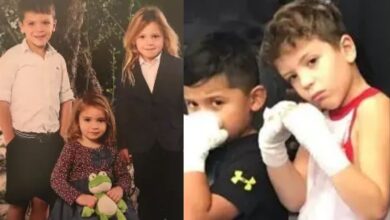Veronica Capone: The Granddaughter Who Redefined a Notorious Legacy

When one hears the name “Capone,” the mind almost invariably wanders to Alphonse “Al” Capone, the gangster-king of Chicago who rose to prominence during America’s Prohibition era. But for his descendants, the legacy carried both weight and anonymity. Among them was his eldest granddaughter, Veronica Frances “Ronnie” Capone Peterson — born into the shadow of one of the 20th century’s most infamous crime figures, yet determined to carve out a quieter, more authentic life.
Family Roots and Early Life
Veronica was born on January 9, 1943, in Miami Beach, Florida. Her father was Albert Francis “Sonny” Capone, the only child of Al Capone and Mae Capone. Her mother was Diana Ruth (Casey) Capone. Veronica was the first of four daughters: Teresa, Barbara, and Patricia (Diane).
Although the family name carried historic notoriety, Veronica’s parents sought to shield their daughters from its burden. She grew up in Florida, away from the limelight and the violent world that made her grandfather’s fame. Her parents wanted their daughters to have normal childhoods — ones filled with school, play, and community rather than the heavy whispers of the Capone name.
Growing Up in the Shadow of “Capone”
Living under a surname etched in headlines and history is no small burden. Veronica’s childhood was shaped in part by the arrangement her father made — raising his family under ordinary circumstances while their heritage remained extraordinary.
Veronica was only four years old when her grandfather died in 1947. She likely had only faint or secondhand memories of him. Her sisters later recalled that the children were too young to attend his funeral, though the memory of their father’s quiet grief remained vivid.
Still, the family name meant that the Capone sisters were occasionally confronted with curious peers and uncomfortable questions. Their father often reminded them to stay calm and not take others’ remarks to heart. He taught them that ignorance, not malice, usually drove people’s fascination with the Capone legacy.
Education, Identity, and Family Life
The Capone household emphasized humility and education. Veronica’s upbringing focused on maintaining privacy and building a life separate from her grandfather’s shadow. The family later relocated to Northern California, where they could enjoy anonymity and a simpler existence.
As an adult, Veronica married and became known as Veronica F. (Capone, Bacon) Peterson. Those who knew her described her as intelligent, gracious, and quietly strong. She carried herself with warmth and dignity — a woman who refused to let her last name dictate her destiny.
Veronica passed away on November 17, 2007, at the age of 64, in Auburn, California, after a courageous five-month battle with leukemia. Her obituary remembered her as a woman of grace and courage, someone who faced life’s difficulties with calm determination. She left behind a family who deeply cherished her strength and humor.
Navigating Legacy and Privacy
One of the remarkable aspects of Veronica’s life is how quietly she lived. She never sought the spotlight, never courted attention, and never used her family name for advantage. In contrast to the media frenzy that followed her grandfather throughout his lifetime, Veronica chose privacy.
Her story represents a profound statement: that a person can acknowledge their heritage without being imprisoned by it. While public curiosity about the Capone family persisted, Veronica and her sisters lived lives that were largely untouched by scandal or celebrity.
Stories have circulated that the Capone family occasionally used alternate surnames to maintain privacy — a reflection of how seriously they guarded their peace. For Veronica, this discretion allowed her to experience an ordinary American life: working, raising a family, and living in relative calm.
The Capone Estate and the 2021 Auction
Decades after Al Capone’s death, the question of what to do with his remaining possessions resurfaced. For Veronica’s family, the items were both heirlooms and burdens. They represented a complicated legacy — part of history, part of family memory.
In 2021, Veronica’s surviving sisters decided to auction off many of their grandfather’s belongings. They explained that, as they grew older, they wanted to ensure the artifacts would be preserved rather than forgotten. Among the items sold were Al Capone’s pocket watch, his favorite firearm, handwritten letters, and other personal effects.
The auction drew worldwide attention, but it was not motivated by greed. For the Capone descendants, it was a way to bring closure to decades of inherited notoriety. By sharing their grandfather’s personal items with collectors and museums, they allowed the world to see a more human side of a man often defined solely by his crimes.
What We Know About Veronica’s Later Years
Information about Veronica’s adult life remains limited — and that in itself speaks volumes. She consciously avoided publicity. Her later years were spent in Northern California, close to her family and friends. She was known to be active in her local community and church circles, though she preferred not to discuss her lineage.
Her passing in 2007 closed a chapter of Capone family history. Those who knew her personally described her as loving, loyal, and unassuming — someone who valued kindness above all else. Her relatives remembered her as “Ronnie,” a nickname that reflected her approachable and affectionate nature.
The grace with which Veronica lived and died stands as a quiet counterpoint to her grandfather’s stormy legacy. Her dignity redefined what it meant to bear the Capone name.
Redefining Legacy
Veronica’s story challenges our assumptions about inherited legacies. Public fascination with famous or infamous families often focuses on drama, scandal, or downfall. Yet Veronica’s life reveals another possibility: healing through silence and integrity.
Where her grandfather was known for violence and rebellion, she embodied empathy and restraint. Where he built notoriety through confrontation, she cultivated peace. Veronica’s existence shows that even the darkest legacies can produce descendants who choose light.
In many ways, she and her sisters became quiet historians of their family’s complicated past. They kept their memories close and refused to let outsiders sensationalize them. The sisters understood that legacy is not what you inherit — it is what you build in response to what you inherit.
The Human Side of the Capone Family
Veronica’s story offers a reminder that behind every infamous name lies a web of ordinary lives. For decades, the public has viewed Al Capone as a symbol — of greed, crime, and power. But to his granddaughters, he was “Papa.”
Family memories portray Al Capone in softer tones: a man who, in his later years, was ill, reclusive, and deeply affectionate with his family. For Veronica, those stories likely offered a more nuanced understanding of her lineage — one that humanized a man otherwise frozen in history as a villain.
That human element gave the Capone sisters strength. They learned to see themselves not as victims of a name but as bearers of complex history. Their calm refusal to exploit their lineage speaks to a quiet moral victory.
Lessons from Veronica Capone’s Life
Veronica’s journey provides insights that extend far beyond her family:
- Identity Is a Choice – Veronica showed that identity is more than ancestry. Despite being linked to one of history’s most notorious figures, she lived by her own principles.
- Privacy Is Power – In an age of exposure, Veronica’s commitment to privacy was an act of self-preservation. She demonstrated that not every story needs to be told publicly to have meaning.
- Legacy Can Heal – Her life was proof that a family legacy, no matter how dark, can evolve. Through compassion and restraint, she helped transform “Capone” from a name of fear to one of reflection.
- Courage in Silence – Sometimes the bravest act is choosing not to perform for the world. Veronica’s quiet existence spoke louder than any headline ever could.
- Grace Under Burden – Living under a name that conjures crime and infamy takes fortitude. Veronica faced it with humility and faith, leaving behind no scandal, only respect.
The Enduring Symbolism of Veronica’s Story
Today, the name Veronica Capone stands for a kind of quiet defiance — the courage to live decently when history tempts you to dramatize your past. Her story reminds us that redemption is not always loud; sometimes it whispers through ordinary lives.
She didn’t leave behind memoirs or interviews. Her legacy is not written in books or headlines, but in the dignity with which she carried herself. For a woman descended from one of America’s most infamous men, that is no small accomplishment.
Her life asks us to reconsider what it means to carry a name, a history, or a burden. She is part of a generation that understood the value of restraint — a generation that knew silence could be more powerful than any defense.
A Life Remembered
Veronica Frances Capone Peterson passed away quietly, surrounded by family, after a brief but valiant fight against illness. She left behind not scandal but admiration. Those who knew her remember her laughter, her strength, and her faith.
Though she will forever be linked to a name that once shook America, Veronica’s personal story tells a very different tale — one of perseverance, humility, and grace.
For readers of Newsta, her life offers a poignant reminder that no matter what name you inherit, you alone define the legacy you leave behind.
1. Who was Veronica Capone?
Veronica Frances “Ronnie” Capone Peterson was the eldest granddaughter of infamous Chicago gangster Al Capone. She was born in 1943 to Al Capone’s only son, Albert Francis “Sonny” Capone, and Diana Ruth Casey.
2. Was Veronica Capone involved in crime like her grandfather?
No. Veronica lived a quiet, private life far removed from her grandfather’s criminal world. She maintained a low profile and focused on her family and personal life.
3. Where was Veronica Capone born?
She was born in Miami Beach, Florida, where her parents had settled after Al Capone’s final years in the state.
4. Did Veronica Capone ever speak publicly about her grandfather?
Veronica herself did not give public interviews. However, her sisters later spoke about their grandfather’s softer side and their experiences growing up as Capones.
5. Did Veronica Capone have siblings?
Yes. She had three sisters: Teresa, Barbara, and Patricia (also known as Diane).
6. Was Veronica Capone married?
Yes. She was married and went by the names Veronica Bacon and later Veronica Peterson.
7. When did Veronica Capone die?
Veronica Capone passed away on November 17, 2007, in Auburn, California, after a brief battle with leukemia.
8. What happened to the Capone family after Al Capone’s death?
After Al Capone’s death in 1947, his family maintained a private life. His son Sonny and granddaughters, including Veronica, lived quietly in Florida and later California, keeping their distance from public attention.
9. What was the 2021 Capone auction about?
In 2021, Al Capone’s granddaughters auctioned many of his personal belongings — such as his pocket watch, letters, and firearms — to preserve history and share a more human side of their grandfather.
10. What is Veronica Capone remembered for today?
Veronica Capone is remembered as a graceful, kind, and private woman who lived a normal life despite being part of one of America’s most infamous families. Her story represents resilience and the power to redefine one’s legacy.



